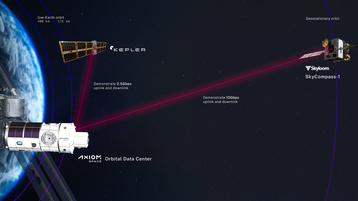Space infrastructure business Axiom Space plans to launch what it calls an 'orbital data center.'
The company is developing the world’s first commercial space station, with the first module targeting a 2026 launch. It will initially be a part of the International Space Station, but is planned to separate and remain in orbit, once the ISS is decommissioned.
As part of the project, Axiom Space is partnering with Kepler Communications US and Skyloom Global to integrate and demonstrate optical inter-satellite links (OISLs) on the initial 2026 module.
This would allow for data to be transmitted to and from the orbital data center through the Kepler and Skyloom relay constellations. The OISLs are expected to allow for up to 10 gigabits-per-second data throughput and meet Space Development Agency (SDA) interoperability standards.
The initial ODC T1 data center deployment is expected to launch by 2027. Ahead of that, Axiom will install a smaller data processing prototype aboard the International Space Station next year.
“We will work to validate use cases at a sub scale and, at the same time, obtain flight heritage on the underlying data center hardware,” Jason Aspiotis, Axiom Space’s director of in-space infrastructure & logistics, said.
“Having a prototype on the ISS will serve as a building block toward the roughly half-cubic-meter sized data server rack we plan to launch by 2027.”
He added: “This is a pivotal moment for in-space data processing infrastructure and capabilities.
“The effort and collaboration with Kepler and Skyloom will help us realize our vision of building and operationalizing the world’s first orbital data center. The data center will provide unprecedented data storage and processing capacity in a commercial, scalable, and economical way.”
The company said that the data center is aimed at providing in-space cloud services without the need to connect back to terrestrial cloud infrastructure - back on Earth, Axiom uses Amazon Web Services.
Should it prove successful, Axiom said that it hopes it will lead to lunar and Mars-based deployments.
NTT has partnered with SKY Perfect JSAT to launch its own space data centers in 2025, while Blue Origin plans to deploy an in-space cloud computing service, and the EU is studying the concept of space data centers.
Storage-focused Lonestar Data Holdings hopes to deploy data centers on the Moon.




